Those who have had the opportunity to work with a great Speech-Language Pathology Assistant (SLPA) know it can really enhance how we serve students in the school setting. We’ve touched on teaming with SLPAs before, and most would agree that the perks of working with an SLPA greatly outweigh any challenges.
In addition to knowing the benefits that come with working with an SLPA, it is also important to know the logistics that come into play. What exactly can an SLPA do? How much supervision is needed, and what does that look like? The short answer is – it depends! State requirements and ASHA guidelines related to SLPA supervision and scope of practice may seem complicated or even contradictory, but understanding them is important.
ASHA Guidelines vs. State Requirements
ASHA provides guidelines about SLPAs scope of practice and supervision. ASHA’s guidelines are helpful in understanding an SLPA’s role and responsibilities across settings. However, it is important to be aware of your state’s requirements related to SLPAs, as those requirements are to be followed to maintain your professional license within the state. In other words, ASHA guidelines lay out best practices and set the direction for our field, but state rules are the law of the land. If an ASHA guideline directly conflicts with a state requirement, you are to follow your state requirement.
SLPA Scope of Practice
ASHA and most states generally agree on the SLPA’s scope of practice. Across settings, SLPAs can:
- Provide direct treatment based on the SLP’s treatment plans
- Conduct screenings (without interpretation)
- Assist the SLP during assessments
- Document the performance of a student by collecting data and preparing records
- Develop and implement materials and activities used within treatment sessions
- Assist with clerical tasks
- Act as a translator, as appropriate
There are some differences in outlined scopes of practice between ASHA and state guidelines, too. For example, ASHA has recently updated its guidelines to indicate that SLPAs are able to assist with assessments and use any assessment tools where the SLPA meets the examiner requirements outlined in assessment handbooks. Examples of such assessment tools include the Batelle Developmental Inventory, the Boehm Test of Basic Concepts, and non-standardized tools like the CUBED narrative assessment. Most states’ guidelines generally have not made this change to allow SLPAs to conduct assessments yet. Read your state rules carefully!
Supervision Requirements
Supervision requirements vary largely from state to state and relative to ASHA guidelines. ASHA no longer has a requirement for a minimum percentage of SLP supervision. Instead, the SLP is to use their best judgment regarding the amount of supervision provided, as long as the SLP has the first contact with a client, sees each student every 30-60 days, and reviews data regularly.
Oregon’s supervision requirements closely reflect ASHA’s guidelines, as students are to be seen at least every 60 days by the SLP under their requirements. This again allows the SLP to use their best judgment to determine what additional supervision and involvement are adequate and appropriate for each student. Oregon’s requirements are also notable for having the SLP and SLPA create and document a supervision plan and keep a log of all consultative meetings held throughout the year.
California’s supervision requirements also leave the amount and type of supervision up to the SLP’s discretion, with no specified parameters for how much supervision or consultation is to take place. Some requirements that are unique to California are that supervising SLPs are to complete 6 hours of continuing professional development in supervision training within the first two years they begin supervising. It’s also important to note that a Responsibility Statement form is to be completed and submitted to the state board when an SLP and SLPA begin working together.
Washington’s requirements are uniquely lax relative to other states. In the state of Washington, support personnel such as SLPAs are not regulated in the school setting and do not need to be licensed by the state. Despite that, our THF SLPAs working in Washington are still licensed by the Washington Department of Health in order to maintain our high quality of care and knowledge.
As you can see from looking at just these three West Coast states, there is tremendous variability in requirements. This underscores how important it is to consider rules with any states you are involved with, especially when using telepractice across state lines. Some other helpful ways to stay up to date with these regulations and requirements are to review rules regularly with your partnering SLP or SLPA, or to join your state association to stay current on supervision matters.
This post was originally published 3/15/17 and most recently updated 1/19/23






